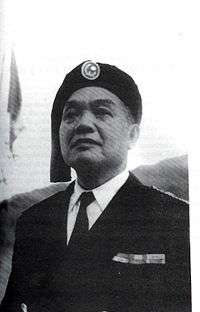Đèo Văn Long

Đèo Văn Long (15 March 1887 – 20 November 1975 in Toulouse) was the French leader of the Autonomous Tai Federation of Northwestern Tonkin in post-war French Indochina.[1]
Auguste Pavie had allied with his father Đèo Văn Trị and France recognised him as leader of Sip Song Chau Tai in 1890.[2] He was the scion of a hereditary feudal noble line with roots in Yunnan province. Đèo Văn Long generated much revenue for the Federation by acting as a middleman in the opium traffic between the Tai Federation and the French. He compelled the Hmong of the Federation to sell to him at below-market prices, thus making enormous profit from his sales to the French. This made him rich, but severed his relationship with the Hmong of the Federation, who supported the Viet Minh during the First Indochina War. His use of force to suppress Hmong resistance also decreased his popularity with the Hmong. As the Dien Bien Phu campaign came to an end, he was helicoptered away from Lai Chau to Hanoi. He went first to Laos, then later immigrated to France as a refugee, but died shortly thereafter. His sons had died in battle leading White Tai partisans against the Viet Minh so in France leadership of the clan line was succeeded[2] by his daughter Deo Nang Toi (d.2008).
References
- ↑ Vietnam - Guide Michelin, 2010 Page 232 "Nommé gouverneur du district par l'administration coloniale en 1940, Deo Van Long devint de fait le suzerain non seulement des Thaïs blancs de Muong Te et de Phong To, mais aussi des Thaïs noirs de Son La. Lorsqu'en 1945 le Viet-minh essaima à partirde sa base du Nord-Vietnam (voir « Histoire», p. 120), Deo Van Long quitta le pays pour la France, où il participa à... Réfugié au Laos, il gagna ensuite la France et mourut à Toulouse en 1975"
- 1 2 "DEO FAMILY most recent Tai country Leaders".
External links
- http://web.archive.org/web/20060822105343/http://www.drugtext.org:80/library/books/McCoy/book/27.htm
- The Montagnards and the State in Northern Vietnam from 1802 to 1975: A Historical Overview
- Deo Van Long and other lord of Laichau
- Official website of Deo lord
- Officiel "Auguste Pavie" website, many sources on Deo Van Tri
| Wikimedia Commons has media related to Deo Van Long. |